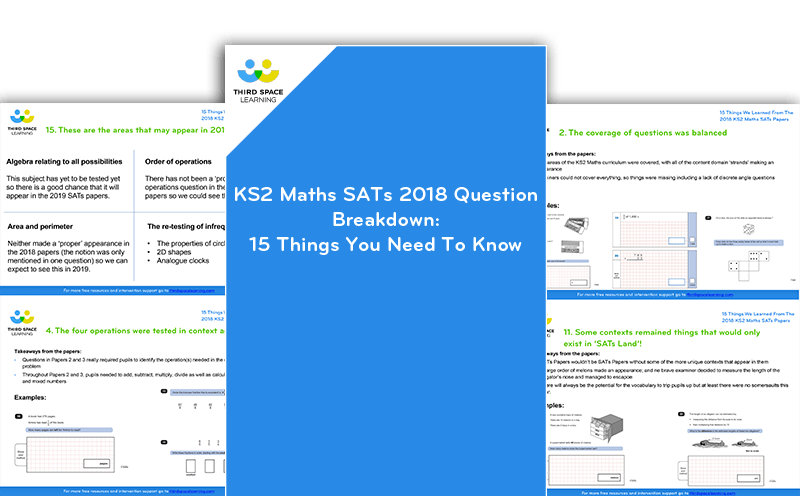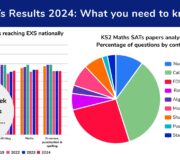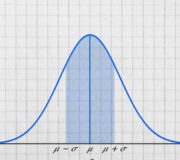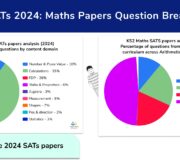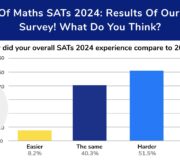Review of Maths SATs 2018: Results of our Teacher Survey! Do You Agree?
Now that KS2 SATs 2018 are over, find out if your reaction to the papers matches the results received from almost 200 UK primary school teachers who answered our survey.
As well as looking at results from the survey and talking to the senior leadership team at the schools we’ve been working with 1-to-1 this year, we have taken to social media to gauge the reaction on Twitter and Facebook among the teaching community.
If you’re looking for one of our other most popular SATS 2018/2019 blog posts go here:
KS2 SATs 2018 Maths Question Analysis – 15 lessons you should take from the papers to help you plan your approach to Maths 2019 plus some clues on what’s likely to come up.
KS2 SATs Results 2018: Guidance for SLT on next steps
Everything you need to know about the dates, times, access arrangements etc for the 2019 SATs
Now back to our SATs 2018 survey results!
Which 2018 KS2 SATs Papers did we ask about in our survey?
Paper 1: Arithmetic, 16th May 2018
Paper 2: Reasoning, 16th May 2018
Paper 3: Reasoning, 17th May 2018
How Difficult were the 2018 KS2 Maths SATs Papers?
It’s fair to say, most teachers felt that Maths was a deal harder than the English papers earlier in the week.
While many found the papers this year to be of a similar level of difficulty to last years Maths SATs Papers, others stated that when compared to the 2017 papers, this year’s were much harder for their pupils.
“Generally OK but some of the styles of questions were off- putting for the children. They need to remember that they are 10/ 11 years old. There were quite a lot of mastery style questions also.”
Y6 Teacher
Were the Papers a Fair Reflection of Pupils Understanding of Maths?
When asked how confident they were that the 2018 SATs papers would prove to be a fair assessment of their pupils’ understanding of Maths, teachers responded with an average of 6.3 out of 10.
Whilst this shows that there was an element of doubt around just how fair these tests were, it reflects the broader theme that seems to be reoccurring on both social media and in our survey, namely that some teachers thought the tests were great and some thought that they were awful!

“They’ve been ok. I didn’t feel like they were worded badly or trying to catch children out (which I did feel last year). The last few were hard but they didn’t get hard until near the end so children felt like they’d had a good go at it.”
Y6 Teacher

“A good level of challenge – questions were well sequenced to help children gain confidence as they progressed through the paper.”
Duncan Webster, Maths Leader

The KS2 Maths Arithmetic Paper Was the Same, if Not a Little Harder than Last Year
From our survey sent out to our database, 53% thought that the difficulty of the 2018 KS2 SATs Arithmetic Paper was roughly the same as its 2017 counterpart.
However, 40% of respondents said that it was harder than last year, so there is a clear divide in opinion.
Interestingly, when we compare it to the results of our SATs 2017 Review only 20% of respondents then thought it was harder than 2016 SATs – the first of the new curriculum tests.
Whilst the paper followed the structure that has come to be expected, there were a couple of questions that had the potential to pose a problem to pupils if their Maths fluency was not up to scratch.
One teacher even commented positively on the design of the paper which will please the examiners I’m sure!
“I like the arithmetic layout since its new design very much. I still get disappointed at questions that feel designed to catch pupils out. Finally, I cannot agree that all their learning be summed up by 3 intense tests in 2 days. It cannot be the best way.”
Deputy Headteacher
Time is always key for pupils on the Arithmetic Paper, and the need for Maths fluency to be ingrained in pupils by the time they sat the papers became evident.
By our estimates only:
- ⅓ of the SATs Arithmetic Paper consisted of Year 6 content
- ¼ of Reasoning Paper 1 was Year 6 content
- ⅓ of Reasoning Paper 2 was made from Year 6 content
This reinforces a point that we here at Third Space Learning have made previously, and that is that SATs are not just for Year 6 classes. Intervention needs to begin much earlier in KS2, and when this happens true fluency is a more attainable goal.
2018 SATs Question Breakdown - Teacher Resource
See the 15 lessons you should take from the 2018 KS2 SATs papers, including clues about what may come up in the 2019 papers to help you prepare for next year!
Download Free Now!What Did the Year 6 Teachers Have to Say?
“Paper 1 was pretty much ‘true to form’ and as we have come to expect from the arithmetic papers. The mix of calculation types was fair and matched the test framework. A bit of a ‘surprise’ question around 2/5 of the way through will have thrown many children if their place value knowledge wasn’t secure, which may have then impacted their confidence for the rest of the paper.
As always, this paper was designed to test true fluency – being able to use, apply and manipulate number and calculations – with even the 2 mark division questions being easy to solve if children understood the connections between numbers and had a conceptual understanding of calculation. Hopefully, many children will have been able to score highly on this, reducing the burden needed mark wise in the reasoning paper to gain expected results.”
Year 6 Maths Consultant

“Arithmetic was fair but a lot to do in 30 minutes if the children did not have the mental strategies for the quick questions.”
Emma Kelley, Assistant Headteacher, West Midlands

“Generally a fair paper- we think the children had a good chance to show what they could do.”
Y6 Teacher
Views from the Pupils
“It wasn’t too bad – I liked most of the questions.”
“I was confused by some questions, but think I did ok overall.”
“I think I rushed and made some silly mistakes, but did ok.”

“It’s better than many of the practice ones we have done.”
The KS2 Reasoning Papers Were Harder Than Last Year
The results from our survey show that 54% of respondents thought that the SATs Reasoning Paper 1 was harder than last year, with 36% thinking that it was much the same.
The exam writers were as creative as ever this year with alligators, melons and Mercury all making an appearance in the questions, and whilst the mercury question posed a problem for some pupils, the melons caused predictable mirth!
The first 2018 SATs Reasoning Paper began in a style that was slightly different to the normal approach to a question 1, but it followed the normal protocol with questions getting harder as the paper progressed.
The coverage was as we have come to expect, and it did meet the test framework well. The placement of some questions was interesting and different to what we have seen before, and there was a mix of very predictable contexts, along with some new ones and some different style of questions that we have not seen much of before.
Children who ‘rush in’ and don’t stop to think and reason also have been disadvantaged by the paper, and this could lead to some interesting results from this paper for children who schools are hoping will be working at greater depth.
What is the Feedback From the Year 6 Teachers?
“Paper 2 was more ‘interesting’ than paper 1.
We should be careful not to let one or two ‘tough’ questions detract from what was, on the whole, a fair paper which tested children’s conceptual understanding, and ensured they were fluent and were able to reason and problem solve.
Taken alongside Paper 1, we can see a clear shift in both papers to questions that ensure that children have ‘true’ fluency and are able to see connections and understand maths conceptually. Children who have been taught conceptually and who are able to reason and problem solve are likely to have scored well on Paper 1 and Paper 2, which really drives home the messages being given by the DfE about the importance of conceptual understanding, fluency, problem-solving and reasoning.”
Year 6 Maths Consultant

“Paper 2 was quite a fair assessment, It began with some simpler questions, with the more challenging ones towards the end.”
Jayne Hathaway, Maths Leader, North East
“Some of the questions seem too challenging to solve in the 40 minutes allowed.”
Danielle Bishop, Y6 Teacher, South East
What did you think of Reasoning Papers? Let us know on Twitter and join the debate around the KS2 Maths SATs 2018 using #sats2018 !
What About the Second Reasoning Paper?
The SATs Reasoning Paper 2 was generally quite a fair paper. It covered a wide range of topics, but had a focus on fluency and reasoning and tested pupils ability to make connections between different areas of Maths.
This paper saw the emergence of some topics on the Maths curriculum that had been missing from the 2016 and 2017 Maths SATs papers. Paper 2 was less about pupils ability to recall numbers, and more about their ability to use, apply and solve problems.

There were a lot of familiar context for pupils throughout the paper, but there were rather more vegetables involved than would normally be expected in a SATs paper!
What Did the Teachers Think?
“All of my pupils finished the paper”
Y6 Teacher
“Half of my class finished with 5 minutes to spare!”
Y6 Teacher
What Did the Pupils Think of the Reasoning Papers?
“It really made me think, but I think I got there.”
“I enjoyed the challenge.”

“Showing us a box of eggs was interesting.”
“What on earth is going on with all those melons???”
How Well Prepared Were Year 6 Pupils for the 2018 Maths SATs Papers?
With SATs 2018 preparation techniques varying from pupil to pupil and school to school, we took a look at how well prepared students some pupils were to tackle the papers this year.
Over recent months, a lot of our focus here at Third Space Learning has been on preparing our pupils for the 2018 SATs. 92% of respondents from schools using our 1-to-1 tuition said that it had been an effective preparation method for their pupils that were sitting SATs this year.
Two of the main ways Third Space Learning has been able to help pupils prepare for their SATs is through building confidence in their Maths abilities (44% of survey respondents said this was the chief benefit of a TSL intervention) and by plugging any gaps that were in pupils Maths knowledge (chosen by 35% of respondents.)
96% of responses in the survey also added that they have used Third Space Learning’s downloadable resources including the ever popular Fluent in Five, and 92% stated that they helped them to prepare for the 2018 SATs Papers. We helped more schools than ever prepare for SATs this year, so if you would like to learn a little more about how we can help your pupils excel throughout KS2 then don’t hesitate to get in touch.
What did Pupils Struggle With on the KS2 SATs 2018?
After taking a deeper look into the data produced by our survey, it is clear that there are 2 key areas of the curriculum that pupils have struggled with this year, and they are reflected in the comments made about the 2018 SATs papers. Their frequency of appearance means we aren’t giving away any secrets but don’t let them drop down the priority list!
Fractions, Decimals and Percentages
“I think the order of the some of the questions was unusual. I also think the arithmetic paper was too heavily weighted towards mixed fractions – it required a lot of steps to complete some calculations.”
Maths Leader

“The papers have been tough but fair. Lots of fractions so far.”
Maths Leader, Greater London.
Algebra
“The algebra question was not in a format they would have recognised.”
Y6 Teacher
“I do need to work on writing algebraic equations more thoroughly.”
Y6 Teacher
What Have Teachers Said They’d do Differently to Prepare Their Year 6 Pupils for KS2 Maths SATs 2019?
When we asked teachers what they would do differently to prepare for 2019 SATs, their answers shared some similarities with those given to the same question last year.
1. Start interventions earlier
“I think the intervention should start a lot earlier so that areas highlighted that children struggle with can be worked on sooner.”
Neil Stanley, TA, North East
Read more: Why your Maths interventions should not start in Year 6.
“I would improve the maths planning and delivery in the lower years in the school.”
Assistant Headteacher, South East
“I would cram more in somehow and start booster work to secure arithmetic in Year 5.”
Chevy Welsh, Y6 Teacher, South East
TRY THIS FREE RESOURCE: 4 Free Diagnostic Tools For Year 5 Assessment
2. Get basic maths skills embedded before Year 6
“I would address the gaps in fractions before Year 6 teaching.”
Y6 Teacher
TRY THIS FREE RESOURCE: Fractions Gap Plugging Pack
“Drum into the year groups lower down to get the basic maths skills of the children embedded – rounding, times tables, simple adding and taking away, basic written methods, multiplying by 10, 100 etc. In Year 6 I often spend more time going over basic maths than anything on the Y6 curriculum!”
Rich Lloyd, Y6 Teacher, South East
TRY THIS FREE RESOURCE: The Ultimate Guide To Maths Mastery
3. Continue to work on true fluency to streamline approaches to the arithmetic paper
A lot of teachers mentioned that their pupils struggled with the arithmetic in the 2018 SATs Papers and that they would work on it more in preparation for the 2019 SATs.
“They seem to really be testing the children’s fluency and there seem to be a reasonable number of ones that the children can get, then quite a lot of longer questions that take a while to work out.”
Y6 Teacher
” I would plan the Year 6 programme to tackle arithmetic first then re-visit it again just before the tests in May ’19. Also, to allow more time for shape and measure.”
Alison Tanner, Maths Leader, South West
“I’d do more arithmetic practice earlier in the year.”
Fran Gallagher, Y6 Teacher, South West
TRY THIS FREE RESOURCE: Fluent in Five
Focus on supporting pupils into becoming resilient mathematicians
This is especially important for the reasoning papers. Children need both the practice and the mindset to see a tricky reasoning question and confidently find a way into it, using the skills and the connections and relationships that exist throughout maths to help them solve the problems.
We’ve heard of several children, even the higher attainers, becoming overwhelmed by the challenge of some questions and it having a negative impact on their success. Prepare children for a struggle on a question or two, on the understanding it won’t have a negative impact on the next question, and equip them with the deep mathematical knowledge and conceptual understanding needed to find their ways into the problems.
But it can work the other way too.
“One child, with a predicted scaled score of 99 seemed to achieve and cope very well, probably dropped a total of 8 marks across all papers. They are just a really thorough reasoner and a resilient mathematician who understand the relationships and connections and maths and found their own way into every question. They seemed able to solve the last question on the arithmetic paper in under a minute- as they found a quick way in, whereas this could have really stumped many children, and they seemed able to do similar on the reasoning papers. This was a testament to the work they and their teacher has done through the year with them, and the positive mathematical resilience that the school has fostered in their pupils”
Year 6 Maths Consultant
“More work on resilience to take on the more challenging reasoning questions.”
Jayne Hathaway, Maths Leader, Ings Farm Primary, North East
Absolutely nothing!
We were delighted to receive some responses which showed fantastic confidence in both teaching ability and pupils.
“I’m happy with the preparation we did this year, so I probably won’t change much.”
Y6 Teacher
“I would continue with the same preparation.”
Primary Headteacher
“Nothing!”
Y6 Teacher
There was one teacher who said that he would do something extremely different to prepare for SATs next year. When asked, Mr Scott, an Assistant Headteacher from the East Midlands, told us that he would “retire!”
Finally a big congratulations to you!
With the 2018 SATs Papers now reaching their conclusion, the anticipation about pass marks and results is bound to begin. It may be difficult, but try to avoid thinking about this for now and rest assured that when the time comes we will share advice and insights from our expert teachers and other schools to help you in this trying time. For now, give yourself a pat on the back!
We hope that the end of SATs 2018 results in a positive feeling around your school, and you are looking forward to a few treats for you and your Year 6 now they’re over!

Well done for the effort you have put in to get your pupils through Year 6 this year. Take this chance to enjoy the sun (if it appears), your half term holiday and the last few weeks with your class. Congratulations from everyone at Third Space Learning!
P.S. Remember to check out our updates on the SATs Reasoning and Arithmetic Papers Question Analysis , and on the KS2 SATs Results 2018!
Read more
DO YOU HAVE PUPILS WHO NEED MORE SUPPORT IN MATHS?
Every week Third Space Learning’s specialist primary maths tutors support thousands of students across hundreds of schools with weekly online 1 to 1 maths lessons designed to plug gaps and boost progress.
Since 2013 these personalised one to one lessons have helped over 150,000 primary and secondary students become more confident, able mathematicians.
Learn about the SATs revision programme or request a personalised quote for your school to speak to us about your school’s needs and how we can help.

